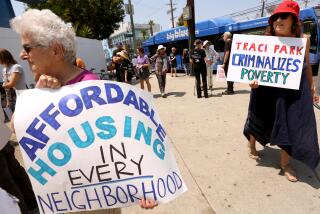The hardy American America punishes
In the same week that the media reported on a burgeoning tent city in California’s capital, Sacramento joined Los Angeles and other cities in making it a crime to scavenge in recycling bins placed in front of homes. A staff report for the Sacramento City Council argued that such scavenging “can result in identity theft, injuries to the scavengers, waste being strewn about the surrounding areas, containers being left open to emit foul odors [and] attract animals and pests, and theft of recyclable material.”
Despite public comments from half a dozen people who said the new ordinance would harm the growing ranks of homeless people, many of whom make money from trading in recyclables, the council approved the law by a margin of 6 to 3.
The three dissenters had their objections, but I don’t think they got to the heart of the problem with the law. Councilman Rob Fong said he thought it wasn’t humane. Councilwoman Bonnie Pannell figured that if the homeless could sell the stuff, the city should “let them have it.”
What’s really wrong with the anti-scavenging picture? It’s that as times get tougher, the middle-class mores that inform such ordinances don’t fit the reality of the growing number of people in our towns and cities who will be obliged to find innovative and, shall we say, quasi-respectable ways to survive.
Not long ago, British historian Simon Schama wrote that “American resourcefulness is one well that won’t run dry,” and for the most part I think he’s right. But these days we’re more likely to define resourcefulness as high-end technological innovation rather than low-level scrappiness. We tend to celebrate the successful entrepreneurial maverick who cuts corners or goes against the grain, while denigrating the hard-nosed survivor on the other end of the social spectrum.
Several years ago, various Southern California cities tried to make it illegal for a person to seek day-labor work on the street. I understand that some neighbors had valid complaints against day laborers trampling their lawns, but the notion that anyone would be punished for seeking a job in an aesthetically unpleasing way strikes me as absurd. The courts have since upheld the rights of day laborers as a 1st Amendment issue.
Think back to the manifold ways that resourceful people survived poverty in the early 20th century -- from selling rags to pushing carts -- and you’ll find that many of those things would get you arrested today.
Street vendors? The city of L.A. discourages them except in one designated area. In the 1990s, when secondhand swap meets were popping up in empty lots all over South L.A., the city sent out parking police to harass customers. Although these makeshift businesses were providing needed goods at decent prices in areas bereft of businesses, and giving small vendors a place to sell their wares, the city discouraged them for not being legal. And, of course, they weren’t. But in bleak terrain that had been torn apart by violence not long before, you’d think the authorities would acknowledge that some economic vitality -- no matter how marginal -- was better than having none at all.
The traditional American value of self-reliance was born on the frontier, where nothing was given and people had to find creative ways to survive. But fortunately and unfortunately, progress and modernization have distanced us from the edgy resourcefulness that is at the heart of our national vitality.
In 1841, in his essay on self-reliance, Ralph Waldo Emerson warned of the debilitating effects of modernization. “The civilized man has built a coach, but has lost the use of his feet. He is supported on crutches, but lacks so much support of muscle. He has a fine Geneva watch, but he fails of the skill to tell the hour by the sun.”
I’m not against the well-intended ordinances and statutes that regulate our environment and our lives. But in pressing times, they appear more pretentious than progressive.
Of course, we’d rather not have people scavenging through bins to find recyclables to sell for money to buy food, not to mention the fact that scavenging can undercut city recycling programs. Naturally, we’d prefer that all retail businesses adhere to some sort of regulated standards. But barring outright criminal activity, in times like these when more and more Americans are losing their homes and their jobs, it seems counterproductive to discourage anyone from finding relatively innocuous ways to help themselves.
Punishing resourcefulness? It’s downright un-American.
--
grodriguez@latimescolumnists.com


